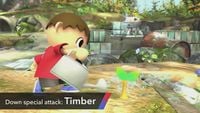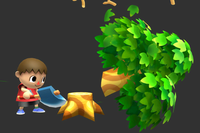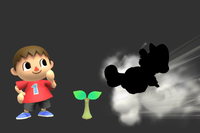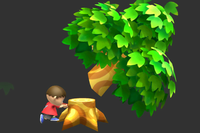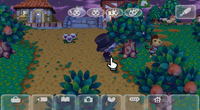Timber: Difference between revisions
(From special move params (https://docs.google.com/spreadsheets/d/1rwDPL1jhE-KuEbbcBkkTb44z1smJp9rYme_xb4BIJTk/edit#gid=760863919)) |
Aceofdarts68 (talk | contribs) Tag: Mobile edit |
||
| (9 intermediate revisions by 4 users not shown) | |||
| Line 26: | Line 26: | ||
*'''Lumbering''': After the tree has sprouted, the move changes to an axe swing. If the axe hits the tree, it will cut into one side on the first hit, then cut it down on the second hit on a side that already has a cut in it—the tree can be cut once on each side without cutting it down. The falling tree does 25% damage and extremely heavy knockback to anyone hit, KOing at 60%. When it lands, it has a [[sourspot]] that only does 15%. It can be [[reflected]], but if this is done from too far away, Villager may be able to [[Pocket]] the tree as it returns to them. The tree is able to fall off [[edge|ledges]] like the Villager's forward smash, but it deals more potent knockback, is slower and more easily telegraphed. | *'''Lumbering''': After the tree has sprouted, the move changes to an axe swing. If the axe hits the tree, it will cut into one side on the first hit, then cut it down on the second hit on a side that already has a cut in it—the tree can be cut once on each side without cutting it down. The falling tree does 25% damage and extremely heavy knockback to anyone hit, KOing at 60%. When it lands, it has a [[sourspot]] that only does 15%. It can be [[reflected]], but if this is done from too far away, Villager may be able to [[Pocket]] the tree as it returns to them. The tree is able to fall off [[edge|ledges]] like the Villager's forward smash, but it deals more potent knockback, is slower and more easily telegraphed. | ||
:When the tree is cut down, it has a | :When the tree is cut down, it has a [[Randomness|chance]] of spawning an [[item]], either a woodchip (48.54%) that can be picked up and thrown for damage, or a much lower chance of spawning a piece of fruit (1.46%) that can be eaten to heal damage. The woodchip will always be spawned in [[Home-Run Contest]]. The fruit that may spawn include Cherry (heals 1%), Orange (2%), Pear (3%), Apple (4%), and Peach (5%). After the tree has fully despawned, the attack resets to Plant Seed again (it remains in Lumbering until the tree is fully gone). | ||
:The axe swing can also be used as a direct attack and is fairly strong in its own right, inflicting 14% damage and KOing at 125%. It comes out quickly for how strong it is, with less startup lag than any of Villager's smash attacks or even tilts, although it has high ending lag. If an opponent stands between Villager and the tree and is hit by the axe | :The axe swing can also be used as a direct attack and is fairly strong in its own right, inflicting 14% damage and KOing at 125%. It comes out quickly for how strong it is, with less startup lag than any of Villager's smash attacks or even tilts, although it has high ending lag. If an opponent stands between Villager and the tree and is hit by the axe and the tree's falling hitbox, they will take a total of 40% damage before they get sent flying with the tree's heavy knockback, making it a powerful combo. However, an opponent standing close to the opposite side of the tree may be sent flying by the axe before the tree can hit them. | ||
A Villager can interact with another Villager's sapling and tree, provided they are on the correct move stage—any Villager's watering can is able to make another Villager's sapling grow to the tree form, and a Villager can also chop down a tree that isn't theirs, turning the tree into their own attack. Each player can only have one sapling on the field at any given time, however, though saplings can be planted right onto another sapling. | A Villager can interact with another Villager's sapling and tree, provided they are on the correct move stage—any Villager's watering can is able to make another Villager's sapling grow to the tree form, and a Villager can also chop down a tree that isn't theirs, turning the tree into their own attack. Each player can only have one sapling on the field at any given time, however, though saplings can be planted right onto another sapling. | ||
| Line 46: | Line 46: | ||
{{CustomSet|Villager|Down|name1=Timber|desc1=Plant a seed, water it, and chop the tree down. Each step has a different effect on foes.|name2=Timber Counter|desc2=A fresh sprout trips opponents, and the fully grown tree fights back if attacked!|name3=Super Timber|desc3=Slower but stronger. Use lots of water to grow a huge tree. The axe has high launching power.}} | {{CustomSet|Villager|Down|name1=Timber|desc1=Plant a seed, water it, and chop the tree down. Each step has a different effect on foes.|name2=Timber Counter|desc2=A fresh sprout trips opponents, and the fully grown tree fights back if attacked!|name3=Super Timber|desc3=Slower but stronger. Use lots of water to grow a huge tree. The axe has high launching power.}} | ||
# '''Timber''': Default. | # '''Timber''': Default. | ||
# '''Timber Counter''': All of the stages have added properties, and each stage is faster. The sapling makes enemies [[trip]] when they step on it, but the watering can has a smaller windbox. The tree (which is | # '''Timber Counter''': All of the stages have added properties, and each stage is faster. The sapling makes enemies [[trip]] when they step on it, but the watering can has a smaller windbox. The tree (which is slightly larger) counters attacks if they do not destroy it. It is slower to wither, but is very weak and cannot withstand much damage. Additionally, it deals less damage and knockback when cut down. Each stage of the tree glows with a pulse (the sapling with blue and the tree with red), making them more obvious. | ||
# '''Super Timber''': All phases are slower. The watering can has a longer range (making the sapling a threat even when Villager is some distance away from it), the tree grows significantly bigger, and the axe has more launching power. The tree is more durable and deals more damage and knockback when growing and when cut down. | # '''Super Timber''': All phases are slower. The watering can has a longer range (making the sapling a threat even when Villager is some distance away from it), the tree grows significantly bigger, and the axe has more launching power. The tree is more durable and deals more damage and knockback when growing and when cut down. | ||
<gallery> | <gallery> | ||
| Line 56: | Line 56: | ||
==Origin== | ==Origin== | ||
[[File:TimberOrigin. | [[File:TimberOrigin.gif|left|thumb|200px|A Villager chopping down a tree in ''Animal Crossing: City Folk''.]] | ||
In the [[Animal Crossing (universe)|''Animal Crossing'' series]], the player can buy tree saplings and plant them in the ground after digging a hole with a shovel. If there are no trees or other obstructions nearby, it will grow in a matter of three days. The player can then use an axe to cut down trees. Standard axes | In the [[Animal Crossing (universe)|''Animal Crossing'' series]], the player can buy tree saplings and plant them in the ground after digging a hole with a shovel. If there are no trees or other obstructions nearby, it will grow in a matter of three days. The player can then use an axe to cut down trees. Standard axes take damage with each hit and eventually break, while the Silver Axe is indestructible in City Folk, and the Golden Axe is indestructible in every ''Animal Crossing'' game except ''New Horizons''. All trees take three swings to fall. After this, the player must use a shovel to get rid of the stump. | ||
Watering cans, axes, and saplings can be purchased from [[Tom Nook]]'s store in older games, in the Gardening Store in ''New Leaf'', and in Nook's Cranny in ''New Horizons''. Additionally, watering cans and axes can be crafted in ''New Horizons''. Watering cans are only used for nurturing and breeding flowers, and do not make trees grow faster. | Watering cans, axes, and saplings can be purchased from [[Tom Nook]]'s store in older games, in the Gardening Store in ''New Leaf'', and in Nook's Cranny in ''New Horizons''. Additionally, watering cans and axes can be crafted in ''New Horizons''. Watering cans are only used for nurturing and breeding flowers, and do not make trees grow right away, or any faster at all. | ||
The fruits that appear from Timber references the five native fruits in the ''Animal Crossing'' series. Every new town/island that is created will start off with one native fruit that can be harvested from trees as a source of income. The other four fruits can then be obtained during certain events or by visiting other towns, which can be grown into fruit trees and sold for more value than the starting fruit. | The fruits that appear from Timber references the five native fruits in the ''Animal Crossing'' series. Every new town/island that is created will start off with one native fruit that can be harvested from trees as a source of income. The other four fruits can then be obtained during certain events or by visiting other towns, which can be grown into fruit trees and sold for more value than the starting fruit. | ||
In ''Super Smash Bros.'', the tree must be hit with the axe only two times to make it fall, unlike trees in ''Animal Crossing'', which need three swings to be felled. Like in ''Smash'', it is technically possible to make the trees fall on the villagers, though it won't affect them. | |||
{{clrl}} | {{clrl}} | ||
| Line 93: | Line 95: | ||
==Trivia== | ==Trivia== | ||
*If a tree is planted while Villager is under the effect of a [[Super Mushroom]], the tree will stay enlarged after the effects have worn off. Villager can still chop down the tree as normal, but the hitbox of the tree will still be larger than regular. The opposite can also occur if Villager consumes a [[Poison Mushroom]]. | *If a tree is planted while Villager is under the effect of a [[Super Mushroom]], the tree will stay enlarged after the effects have worn off. Villager can still chop down the tree as normal, but the hitbox of the tree will still be larger than regular. The opposite can also occur if Villager consumes a [[Poison Mushroom]]. | ||
*Oddly, the fruit that can spawn from this move have hurtboxes, and can be hit by attacks. They cannot be destroyed, however. | |||
{{Special Moves|char=Villager}} | {{Special Moves|char=Villager}} | ||
Latest revision as of 08:24, May 18, 2024
| Timber | |
|---|---|
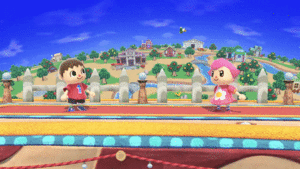 The steps to using Timber | |
| User | Villager |
| Universe | Animal Crossing |
| Article on Nookipedia | Tree |
Timber (タネ植え/水やり/伐採, Plant Seed/Watering/Lumbering) is Villager's down special move.
Overview[edit]
Timber is actually 3 different moves in one, as the Japanese name implies:
- Plant Seed: the Villager plants a sapling in the ground. The sapling remains for about 14 seconds before it disappears, resetting the attack to Plant Seed. In this phase, the move fails when used in the air or on steep enough slopes; in these situations the Villager takes out a shovel, shrugs, and a "dud" noise (the same used when Pocket does not pocket anything) plays. While the sapling is on the stage, this moves changes to Watering.
- Watering: the Villager pulls out a watering can and sprays some water from it, creating a short-ranged push hitbox like other Water attacks. When used close enough to water a planted sapling, a fully grown tree quickly sprouts. If an opponent touches the tree as it sprouts, they will take 18% damage and strong vertical knockback that can KO at 85%. The tree can stay on the field for about 14 seconds before it disappears, resetting the attack to Plant Seed. Attacking the tree will cause it to disappear sooner. The water from the can is reflectable—if the sapling is watered by reflected water, its growing hitbox will be property of the reflector's user. [1]
- Villager can move and jump while using the watering can, and the amount of water needed to make the sapling grow need not be given to it all at once. Thus, if Villager starts to water the sapling but moves away before it sprouts, when it is watered again it will sprout more quickly than usual. This can be exploited to catch opponents with the growing hitbox more easily.
- While the tree is out, this moves changes to Lumbering.
- Lumbering: After the tree has sprouted, the move changes to an axe swing. If the axe hits the tree, it will cut into one side on the first hit, then cut it down on the second hit on a side that already has a cut in it—the tree can be cut once on each side without cutting it down. The falling tree does 25% damage and extremely heavy knockback to anyone hit, KOing at 60%. When it lands, it has a sourspot that only does 15%. It can be reflected, but if this is done from too far away, Villager may be able to Pocket the tree as it returns to them. The tree is able to fall off ledges like the Villager's forward smash, but it deals more potent knockback, is slower and more easily telegraphed.
- When the tree is cut down, it has a chance of spawning an item, either a woodchip (48.54%) that can be picked up and thrown for damage, or a much lower chance of spawning a piece of fruit (1.46%) that can be eaten to heal damage. The woodchip will always be spawned in Home-Run Contest. The fruit that may spawn include Cherry (heals 1%), Orange (2%), Pear (3%), Apple (4%), and Peach (5%). After the tree has fully despawned, the attack resets to Plant Seed again (it remains in Lumbering until the tree is fully gone).
- The axe swing can also be used as a direct attack and is fairly strong in its own right, inflicting 14% damage and KOing at 125%. It comes out quickly for how strong it is, with less startup lag than any of Villager's smash attacks or even tilts, although it has high ending lag. If an opponent stands between Villager and the tree and is hit by the axe and the tree's falling hitbox, they will take a total of 40% damage before they get sent flying with the tree's heavy knockback, making it a powerful combo. However, an opponent standing close to the opposite side of the tree may be sent flying by the axe before the tree can hit them.
A Villager can interact with another Villager's sapling and tree, provided they are on the correct move stage—any Villager's watering can is able to make another Villager's sapling grow to the tree form, and a Villager can also chop down a tree that isn't theirs, turning the tree into their own attack. Each player can only have one sapling on the field at any given time, however, though saplings can be planted right onto another sapling.
The woodchip is part of Villager's zero-death infinite combo, due to having low knockback which can cause jab resets. Immediately after the woodchip hits an opponent, Villager footstools them, then catches the woodchip again and throws it back down onto the opponent, footstools again, and continues the cycle.[2]
Instructional quotes[edit]
| Plant a seed, water it to grow a tree, and then fell it with an axe. | ||
| Plants a seed, waters it, and chops the tree down. Each step has a different effect on foes. |
Customization[edit]
Special Move customization was added in Super Smash Bros. 4. These are the variations:
| 1. Timber | 2. Timber Counter | 3. Super Timber |
|---|---|---|
| "Plant a seed, water it, and chop the tree down. Each step has a different effect on foes." | "A fresh sprout trips opponents, and the fully grown tree fights back if attacked!" | "Slower but stronger. Use lots of water to grow a huge tree. The axe has high launching power." |
- Timber: Default.
- Timber Counter: All of the stages have added properties, and each stage is faster. The sapling makes enemies trip when they step on it, but the watering can has a smaller windbox. The tree (which is slightly larger) counters attacks if they do not destroy it. It is slower to wither, but is very weak and cannot withstand much damage. Additionally, it deals less damage and knockback when cut down. Each stage of the tree glows with a pulse (the sapling with blue and the tree with red), making them more obvious.
- Super Timber: All phases are slower. The watering can has a longer range (making the sapling a threat even when Villager is some distance away from it), the tree grows significantly bigger, and the axe has more launching power. The tree is more durable and deals more damage and knockback when growing and when cut down.
Timber Counter's sapling causes Samus to trip.
Origin[edit]
In the Animal Crossing series, the player can buy tree saplings and plant them in the ground after digging a hole with a shovel. If there are no trees or other obstructions nearby, it will grow in a matter of three days. The player can then use an axe to cut down trees. Standard axes take damage with each hit and eventually break, while the Silver Axe is indestructible in City Folk, and the Golden Axe is indestructible in every Animal Crossing game except New Horizons. All trees take three swings to fall. After this, the player must use a shovel to get rid of the stump.
Watering cans, axes, and saplings can be purchased from Tom Nook's store in older games, in the Gardening Store in New Leaf, and in Nook's Cranny in New Horizons. Additionally, watering cans and axes can be crafted in New Horizons. Watering cans are only used for nurturing and breeding flowers, and do not make trees grow right away, or any faster at all.
The fruits that appear from Timber references the five native fruits in the Animal Crossing series. Every new town/island that is created will start off with one native fruit that can be harvested from trees as a source of income. The other four fruits can then be obtained during certain events or by visiting other towns, which can be grown into fruit trees and sold for more value than the starting fruit.
In Super Smash Bros., the tree must be hit with the axe only two times to make it fall, unlike trees in Animal Crossing, which need three swings to be felled. Like in Smash, it is technically possible to make the trees fall on the villagers, though it won't affect them.
Gallery[edit]
The tree hitting Mario.
The cut down tree landing on King Dedede and Marth.
Names in other languages[edit]
Trivia[edit]
- If a tree is planted while Villager is under the effect of a Super Mushroom, the tree will stay enlarged after the effects have worn off. Villager can still chop down the tree as normal, but the hitbox of the tree will still be larger than regular. The opposite can also occur if Villager consumes a Poison Mushroom.
- Oddly, the fruit that can spawn from this move have hurtboxes, and can be hit by attacks. They cannot be destroyed, however.
